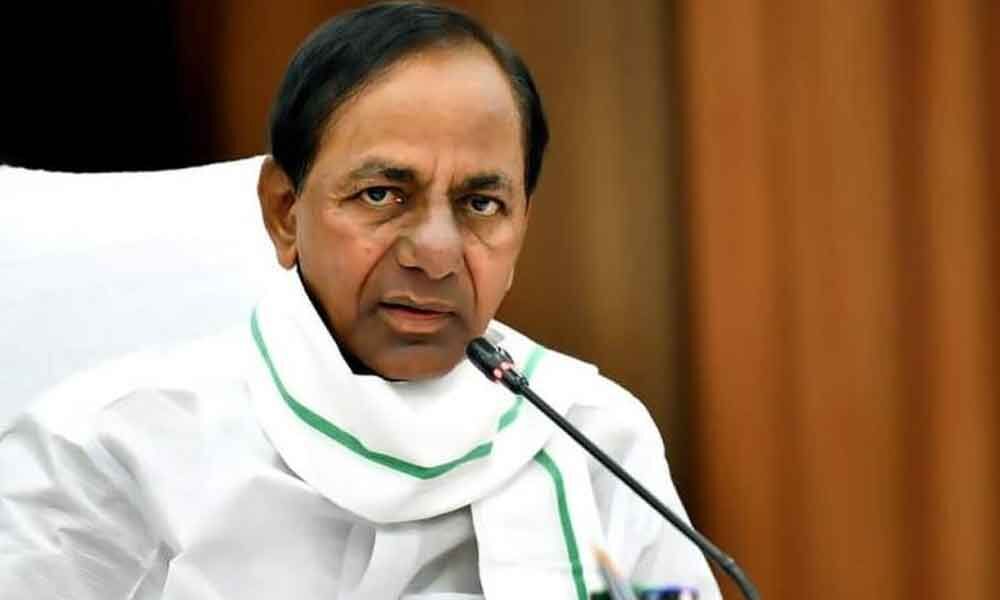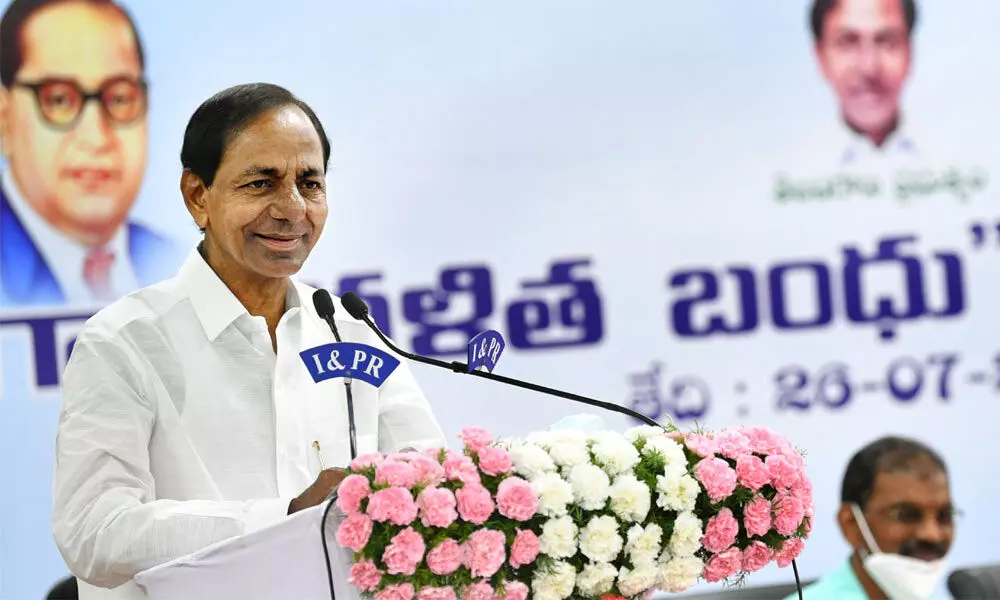Telangana Chief Minister K Chandrasekhar Rao, or KCR, is coming out as the messiah for the Dalits. In a recent announcement, he said that his government would spend 80,000 crore to Rs 1 lakh crore for the ambitious Dalita Bandhu scheme. This scheme is the biggest direct benefit transfer scheme of the country, which will empower the Dalit population in Telangana. K Chandrasekhar Rao is the head of the regional political party of Telangana called Telangana Rashtra Samiti.
Due to the oppressive caste system, Dalits and other lower caste people have suffered historically. The caste system had a cumulative effect on economic prospects, social life, well-being and dignity of the lower caste population. Dalita Bandhu scheme will be started from the Huzarabad assembly constituency on a pilot basis. Huzarabad is a very convenient place to start the Dalita Bandhu scheme because by-elections are due. This stunt received strong criticism from the opposition parties. Opposition parties have called it a poll stunt, and all talk no show.

The CM responding to the criticism has said that if the welfare work done by a state government for its people provides political gain, then there is nothing wrong with it. The state Chief Minister also said that this welfare programme would be turned into a nationwide movement empowering the Dalits. The CM will urge the Centre to implement the scheme nationwide. Apart from tall claims and promises of welfare, a government order is yet to be released.
The policy is the brainchild of the CM and was formulated behind-closed-door meetings.
What is the Dalita Bandhu scheme of Telangana? What are its prospects?
It is a welfare flagship programme of the Telangana government which will empower Dalit families and enable an entrepreneurship environment among them. The scheme will work based on direct benefit transfer or DBT. The scheme will deposit ten lakh rupees in bank accounts of identified beneficiaries or Dalit families. Once this flagship programme gets going, it will be the biggest cash transfer scheme in the country.
A programme aimed for Dalit upliftment and empowerment was announced in the state budget. On June 25, Chief Minister K Chandrasekhar Rao took subsequent all-party meetings to elect Dalit representatives and leaders to discuss the intricacies of the scheme. BJP has called the scheme hogwash and did not attend the day-long all-party meeting.
Telangana has 119 assembly constituencies. The meeting decided that a hundred families from each constituency will be identified as beneficiaries under the scheme, which makes the total number of beneficiary families 11,900. These beneficiary families will be given cash assistance of ten lakh rupees without any bank guarantee to start their business or other work.
To implement the scheme, initial funding of Rs.1200 crore was sanctioned. The CM has clarified that funding for Dalita Bandhu Scheme will be over and above the SC Sub Plan. Meaning there is no change in the existing welfare policies for the scheduled caste.
Why is Huzarabad chosen as the first place to implement the Dalita Bandhu Scheme?
The CM K Chandrasekhar Rao believes that the scheme should start bringing benefits to the poorest of the poor first; hence Huzarabad is chosen. The scheme will be rolled out in the entire state in a phased manner after it is first tested at Huzarabad. Rolling the scheme first in Huzarabad will give the government insight into the scheme and lacunae if it exists.
Apart from this, the government also engaged in gathering public opinion. The officials interacted with Dalit families and visited Dalit colonies to find out their views before preparing guidelines for the scheme. After scrutinising information collected based on guidelines, 20,929 families will be selected from the constituency. Chief Minister KCR conducted an orientation meeting with 427 Dalit men and women from the Huzarabad constituency.
The conference had a pair of men and women from every village and municipal ward and 15 resource persons. The meeting covered details like objective, implementation and monitoring of the scheme. Apart from monitoring project will also create a safety fund for the beneficiaries with participation from the government. The allotted 1200 crore rupees and additional 2000 crore rupees have been allotted to Huzurabad alone for a pilot project.

How is the scheme being implemented?
This scheme is different from other Dalit empowerment schemes because this time, the KCR government will not engage in bank guarantees from the beneficiary. This means that the scheme is absolutely free. The cash transfers are absolutely free with no repayment clause. It’s like the genie of Aladdin has granted a wish of ten lakh rupees without any conditions.
KCR says that a bank guarantee is an absurd concept because people who need government assistance do not have any guarantee, or else they would have approached the bank and availed loan a long time back. The KCR administration has formulated the scheme so that there is no middleman to avoid corruption.
What are the other schemes that the KCR government has for the Dalit community?
Apart from depositing free cash into the account of identified beneficiaries, the state government has a lot of welfarist tricks up their sleeves. The government aims to promote entrepreneurship amongst the Dalit community. Apart from the scheme, the government has decided to start a reservation system for Dalits in issuing government licenses.
The government will resort to a quota for issuing licences for wine shops, rice mills, medical shops, et cetera. The beneficiary will have diverse choices like buying paddy planting machines, auto trolleys, power tiller machines, et cetera to set up farm mills. The government will also provide choices to set up a dairy farm, oil mills, steel, cement, bricks business, furniture shops, clothes shops, mobile shops, tiffin centres, poultry farms, et cetera.

The government will also create a corpus called a security fund permanently to support the beneficiary families in emergencies and adversities. A district collector and a committee of beneficiaries will manage the fund. To ensure real-time monitoring of the scheme, every beneficiary would be provided with an identity card with an electronic chip by the government.
Why the ambitious welfare scheme proposed by the KCR government received criticism?
The Congress party in the state have called the scheme nothing but a political stunt gaining favour in the upcoming by-polls. KCR did not deny the timing but believes that if welfare policies provide political gain, then so be it. Many criticisms have been raised on faulty implementation and slow working of other schemes like the SC and ST Sub Plan. The TRS government failed to spend the allocated funds every year. It only cleared one lakh applications out of nine lakh applications received under the ST finance corporation in the last seven years.
This deprived identified beneficiaries of the 3-acre land that they were promised under the government’s flagship scheme. The TRS government also failed to fill job vacancies in government sectors and dishonoured the SC/ST Prevention of atrocities act. Political leaders asked questions that while the TRS failed to ensure self-respect and social justice, what will a mere sum of ten lakh rupees do. Apart from Huzarabad other constituencies that have a high SC population are the most marginalised. Ideally, the Dalit Bandhu scheme should have been implemented first there.
Why are by-elections conducted in Huzurabad?
By-elections in Huzurabad are being conducted because the TRS MLA Eatala Rajinder had to resign from the post and party owing to a string of enquiries against him. Rajinder allegedly grabbed government land assigned to the farmers and sold it to a company owned by his family. Rajendra later joined BJP and has started touring the constituency extensively. Winning the by-elections in the Huzurabad constituency is a prestigious matter for KCR and TRS.



